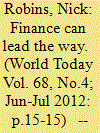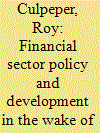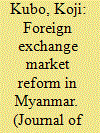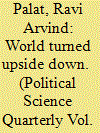| Srl | Item |
| 1 |
ID:
123247


|
|
|
| 2 |
ID:
116882


|
|
|
|
|
| Publication |
2012.
|
| Summary/Abstract |
Financial sector liberalisation has led to market failure on a massive scale. In industrial countries market failure led to the Great Financial Crisis that erupted in 2007 and continues into its fifth year. In developing countries liberalised financial markets have failed to provide access to financial services for the vast majority of households and firms. Small and medium-sized enterprises (smes), which are critical for employment, income creation and economic development, are particularly excluded by liberalised private financial markets. Market failure necessitates government intervention. To enhance smes' financial access requires an activist role by governments-not only by ensuring an enabling policy framework and financial infrastructure for smes, but also by supporting direct provision of financial services through national development banks and directed credit programmes. More broadly the crisis also provides an opening for a neo-structuralist development paradigm to replace the failed Washington Consensus. In this context activist financial sector policies should be integrated with industrial sector strategies.
|
|
|
|
|
|
|
|
|
|
|
|
|
|
|
|
| 3 |
ID:
132572


|
|
|
|
|
| Publication |
2014.
|
| Summary/Abstract |
Myanmar has made an overt move from a de facto multiple exchange rate system to a managed floating exchange system, but the impact of reform of the foreign exchange market on the economy remains unclear. While reform measures have alleviated segmentation within the foreign exchange market, they have not completely driven out transactions that take place within a pre-existing parallel market. Such transactions may be cost efficient for individual firms, but could hinder the development of the financial sector.
|
|
|
|
|
|
|
|
|
|
|
|
|
|
|
|
| 4 |
ID:
096658


|
|
|
|
|
| Publication |
2010.
|
| Summary/Abstract |
By focusing on the consequences of the dismantling of regulations over the financial sector, the current debate on the causes of the global economic meltdown obscures the cyclical occurrence of speculation in capitalism, as the accumulation of more capital than can be profitably invested in the production and sale of commodities results in financial expansion. Historically financial expansion has signalled the end of one world-scale system of accumulation and the transition to a new system as capital flows from declining powers to rising powers. However, the contemporary period is distinguished by capital flows from rising powers to declining ones. An analysis of the current crisis suggests a reversal of this anomaly as it reduces the ability of China and other East Asian states to support the US dollar. At the same time 'emerging market economies' have begun to forge new relationships that could provide the framework for a new system of partnership between states and enterprises to reconstruct a new cycle of accumulation if two hurdles are overcome: 1) absorption of labour that is being displaced because of the high organic composition of capital and 2) dampening of the growing inequalities in income which has not only restricted the growth of markets but is also fuelling increasing social conflict.
|
|
|
|
|
|
|
|
|
|
|
|
|
|
|
|